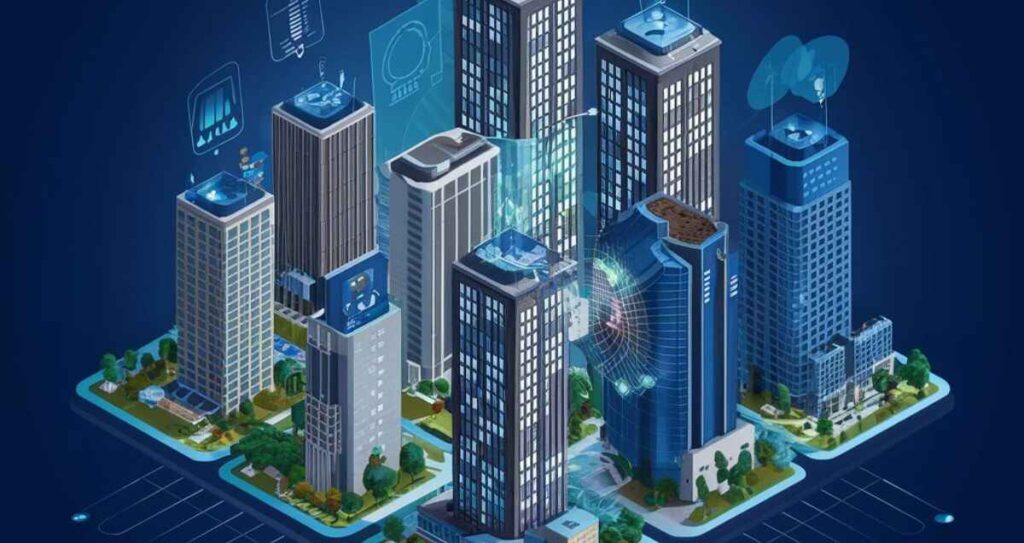Advantages Of Smart City leverages digital technology and data analytics to enhance urban living. By integrating systems like transportation, energy, and public services, smart cities aim to improve efficiency, sustainability, and the overall quality of life for residents.
Imagine a city where traffic flows smoothly, energy is conserved, and public services operate seamlessly. This is the promise of smart cities, where the Advantages Of Smart City technology transform urban living into a more efficient, sustainable, and enjoyable experience.
One of the primary Advantages Of Smart City is their ability to enhance operational efficiency. By utilizing IoT devices and data analytics, cities can optimize services such as traffic management and waste collection. For example, smart traffic signals adjust in real-time to improve traffic flow, significantly reducing congestion.
Enhanced Efficiency

One of the most significant Advantages Of Smart City is their ability to enhance operational efficiency. By utilizing Internet of Things (IoT) devices and data analytics, smart cities can monitor and optimize various urban systems, including:
- Traffic Management: Smart traffic signals adjust in real time based on traffic flow, reducing congestion and improving travel times.
- Waste Management: Sensors in trash bins alert waste management services when they need to be emptied, optimizing collection routes and schedules.
Case Study: Barcelona
Barcelona has implemented smart traffic management systems that adapt traffic light patterns based on real-time data. This has led to a 20% reduction in traffic congestion, demonstrating how smart technology can significantly enhance urban efficiency.
Improved Sustainability
Smart cities prioritize sustainability through innovative technologies and practices. By focusing on energy efficiency and resource management, these urban areas can reduce their environmental impact. Key sustainability advantages include:
- Energy Management: Smart grids enable real-time monitoring of energy consumption, allowing for better energy distribution and reduced waste.
- Water Conservation: Smart irrigation systems use sensors to optimize water usage in public parks and gardens, promoting efficient resource management.
Example: Copenhagen
Copenhagen is recognized as one of the world’s leading smart cities, focusing on sustainability. The city aims to become carbon-neutral by 2025, with initiatives such as smart waste management systems and renewable energy sources that significantly contribute to reducing emissions.
Enhanced Quality of Life
Smart cities aim to improve the quality of life for their residents through various technological advancements. By streamlining urban services and creating a more livable environment, smart cities offer benefits such as:
- Public Safety: Smart surveillance systems and data analytics help law enforcement respond more effectively to emergencies, reducing crime rates and enhancing community safety.
- Health Services: Telehealth services and smart health monitoring systems provide residents with easier access to healthcare, promoting better health outcomes.
Example: Amsterdam
Amsterdam’s smart city initiatives include health monitoring apps that help citizens manage chronic illnesses. These apps enhance patient engagement and reduce the burden on healthcare facilities, demonstrating how technology can improve quality of life.
Greater Mobility and Accessibility

Mobility is a critical aspect of urban living, and smart cities excel at providing efficient transportation options. The advantages include:
- Integrated Public Transport: Smart cities offer real-time information about public transportation schedules and availability, making commuting easier and more efficient.
- Shared Mobility Solutions: Services like ride-sharing and bike-sharing reduce the need for private vehicles, contributing to less traffic congestion and lower emissions.
Example: Singapore
Singapore has implemented an integrated public transport system that combines buses, trains, and taxis. Real-time data enables residents to plan their journeys effectively, making public transport a convenient and popular option.
Economic Growth and Job Creation
The shift toward smart city technologies can stimulate economic growth and create job opportunities. As cities invest in technology and infrastructure, they often attract businesses and talent. Advantages include:
- Innovation Hubs: Smart cities foster innovation by creating environments conducive to startups and tech companies.
- Job Creation: The demand for skilled professionals in areas like data analytics, IoT, and urban planning leads to job creation in various sectors.
Example: San Francisco
San Francisco is a prime example of a smart city that has fostered a thriving tech ecosystem. With its focus on innovation and technology, the city has attracted numerous startups and established companies, driving economic growth and job opportunities.
Conclusion
Advantages Of Smart City are transformative, making urban living more efficient, sustainable, and enjoyable. By leveraging technology and data analytics, smart cities enhance the quality of life for residents while promoting economic growth and environmental stewardship.
As cities worldwide adopt smart technologies, the vision of a more connected and intelligent urban future is becoming a reality. Embracing the smart city concept could significantly reshape how we experience urban living, providing countless benefits for generations to come.
David Mark is a tech and science enthusiast and the writer behind TechNsparks. With a passion for innovation and discovery, David explores the latest advancements in technology and scientific research. His articles provide insightful analysis and engaging commentary, helping readers stay informed about cutting-edge developments. Through TechNsparks, David aims to make complex tech and science topics accessible and exciting for everyone.
